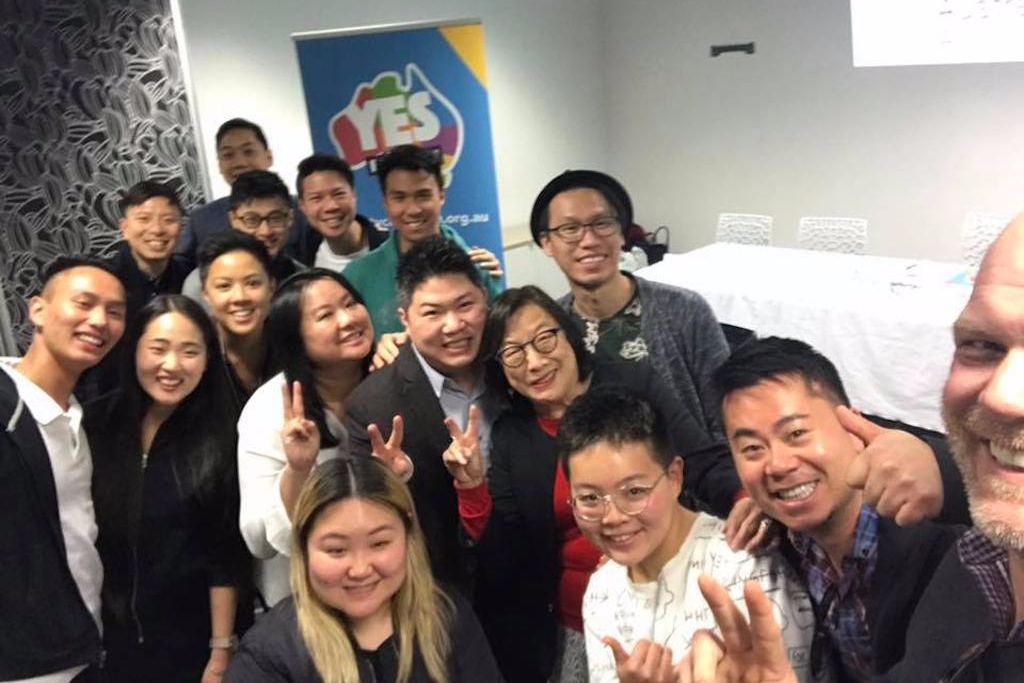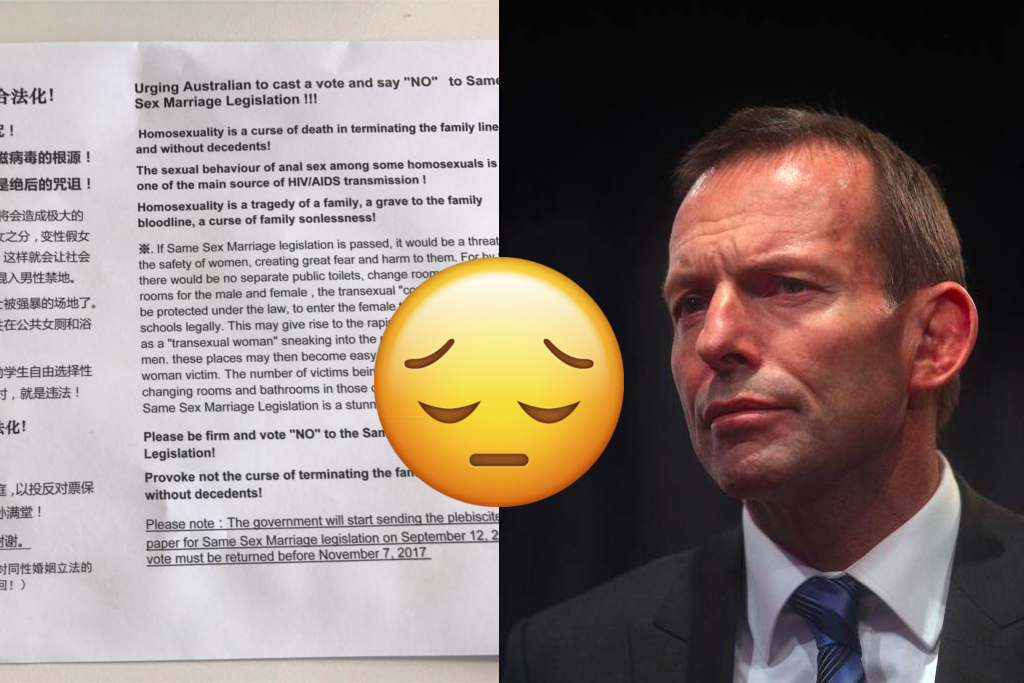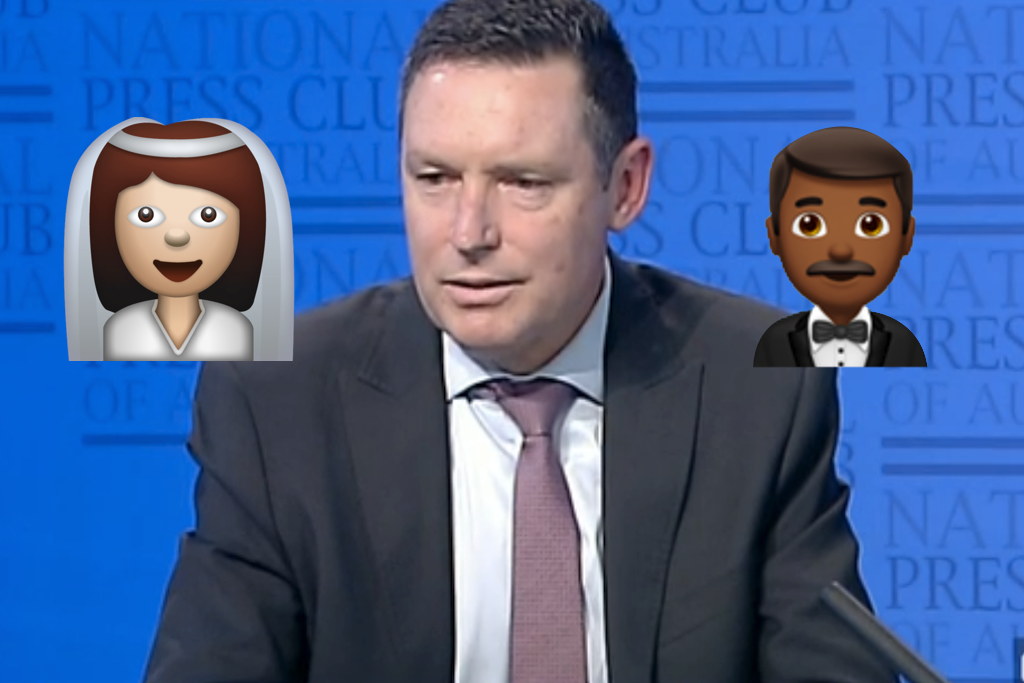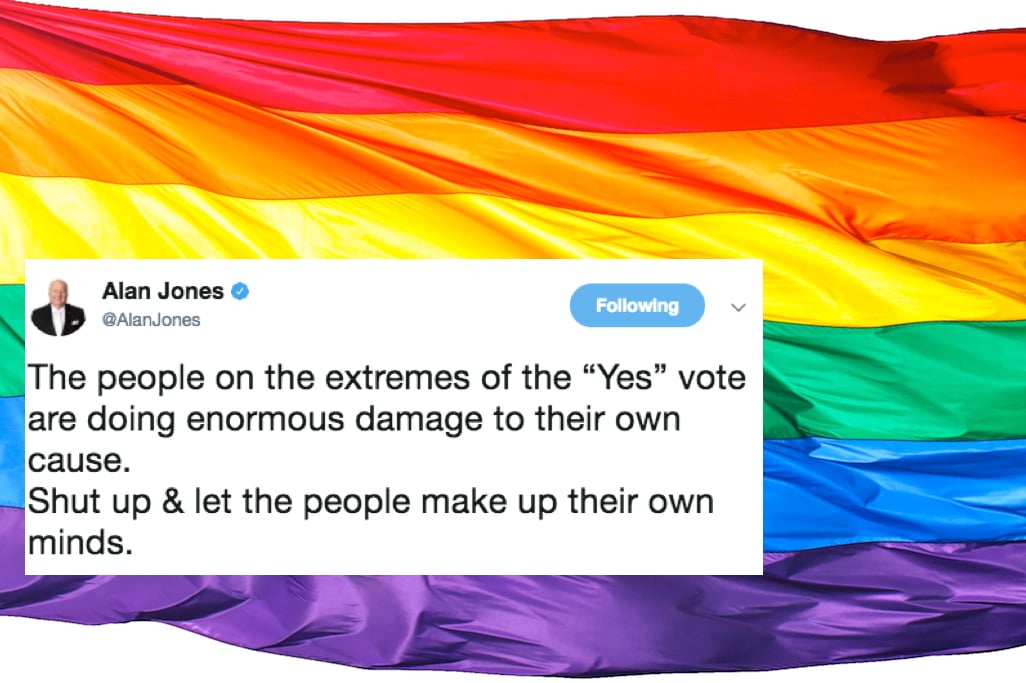Queer People Of Colour Are More Than The Caricatures Drawn By Conservatives
Asian Australians are more than the caricature drawn by conservatives.

Growing up Chinese-Australian has meant that my understanding of marriage has been both unique and bizarre. My mother once claimed that, “marriage is like a temple of love and every lunar year you have to respect the monks living inside that temple.”
My father, who grew up in a poor Chinese village has always been more of a utilitarian, equating love and marriage to sacrifice.
“The only way to really know you’re ready to get married,” he once claimed without any sense of irony, “is if you’re willing to jump into a well full of human faeces after your loved one has fallen inside.”
Three weeks ago when the marriage equality postal survey was announced, my parents were confronted with the need to define marriage beyond metaphorical temples and wells of human faeces.
It didn’t surprise me that Mum’s initial reaction to homophobia was: “I’ve read that young people are becoming homosexuals because of food colouring” and Dad took up Cory Bernadi’s line of thinking: “Will gays want to marry animals after this?”
Queer people of colour are trapped between two disheartening worlds: one that judges them for the colour of their skin and one that shames them for who they want to love. It’s no wonder that we’re more likely face higher rates of anxiety, depression and suicide.
As their queer daughter who— for obvious reasons — is not out to my parents, questions like these make me want to scream into a dark abyss. “Food Colouring Makes Gays Propose To Cows” is a heading you’d read in The Onion. But I always remind myself that my parents’ homophobia is informed by a complex combination of poverty and oppression they face as first generation Chinese migrants.
Unlike western society where homophobia and traditional marriage have been predominantly informed by Christianity, my parents’ understanding of marriage stems from China’s Communist Cultural Revolution. Mao Zedong persecuted homosexuals, deeming them “deviant” and “decadent”. Prior to Communist rule, homosexuality had a rich and tolerated history in China, with Emperor Ai being the most famous homosexual leader. But as the Communist Party rose to power, Chinese LGBT+ people became persecuted. In the 1980s, independent education and freedom of speech were replaced by propaganda and censorship. My parents’ understanding and education of diverse experiences were limited growing up, ever worsened by the poverty they faced until they were lucky enough to move to Australia.
This, of course, does not excuse their views. Since moving to Australia they’ve become well-educated, middle class individuals. So as I began to ask them more about what has informed their views on same-sex marriage I was quite shocked to hear their arguments. There was little to do with the legality or their justification of the traditional idea of marriage. Instead, they focused on their fears that same-sex marriage would lead to “rapes in bathrooms”, “paedophilia” and “being forced to change gender”.
Where had these ideas come from?
In the lead-up to the same-sex marriage postal survey, misinformation, and hate speech were not regulated. By the time temporary anti-vilification laws were passed last week, a lot of the fear-mongering was already done. Anonymous pamphlets have been circulated around predominately Chinese communities, claiming that if same-sex marriage occurs bathroom laws will change, allowing men to rape women inside bathrooms and transmit HIV/AIDS. Another stated that voting for Labor would lead to “children becoming homosexual”, “children having 63 genders” and children masturbating.
Delivered to the Junkee office in Surry Hills today pic.twitter.com/2FTDqIdmZH
— Rob Stott (@Rob_Stott) August 24, 2017
Where white Australians have access to mainstream media, many migrants rely on alternative media to receive their news. This includes bilingual Australian news outlets – some of which are controlled by governments— and letterboxing. Information is scarce. The government’s lack of foresight and complicity in preventing damaging material has made migrant communities easily exploited targets of fear-mongerers. It speaks volumes to why my parents have associated same-sex marriage with “rape” and “paedophilia”.
Let’s Stop Stereotyping Migrants
But not all migrants are homophobic or against queer rights. The Australian National University’s 2013 Australian Election Study found that 34 percent of migrants from non-English speaking backgrounds support gay marriage, while 24 percent felt indifferent about it.
I feel the need to say this because when conservative politicians aren’t freaking out about non-white migrants stealing Australians jobs or gobbling up welfare, they’re conveniently using minority cultures to justify their denial of queer rights and safety. Eric Abetz once stated that we can’t legalise same-sex marriage in the “Asian century”, and Barnaby Joyce has argued that Asians would think Australians are “decadent” if gay marriage was legislated. Dr Pansy Lai is being used in the media as the spokesperson for the entire Chinese community – implicating culturally essentialist arguments that same-sex marriage is incongruous to Chinese culture.
Of course, we know that’s not true. Taiwan has legalised same-sex marriage. A Chinese tech firm owns Grindr and India has 69,000 daily active users. Singapore has a strong LGBT+ movement called “The Pink Dot”. Hong Kong has the oldest Lesbian & Gay Film Festival in Asia. South Korea and Japan have yearly pride parades that are attended by thousands.
Most importantly and most forgotten is the fact that queer people exist in all genders, races, religions and countries.
Queer People of Colour Exist
I’m Chinese and I’m queer. Neither contradicts the other.
I’m Chinese and I’m queer. Neither contradicts the other.
Hateful pamphlets and conservatives using our culture to justify the denial of our own rights often leaves queer people of colour feeling as if they must between their culture or their sexuality, and it sucks.
On one hand, we face intense homophobia from our own cultural community. This forces us to distance ourselves from our culture. On the other hand, the most visible queer-friendly spaces are predominately white. Many of us face racism, microaggressions and othering. We are placed in positions where we have to defend our culture or religion to not only conservatives but white LGBTQI+ members or allies who misunderstand or discount our culture or religion for being inherently oppressive or homophobic. This is especially true for queer Muslims who constantly need to justify their faith and their sexuality.
Queer people of colour are trapped between two disheartening worlds: one that judges them for the colour of their skin and one that shames them for who they want to love. It’s no wonder that we’re more likely face higher rates of anxiety, depression and suicide.
What Can We Do?
"All types of marriages uphold family values and strengthens communities." – Asian Australian Alliance say #VoteYes. https://t.co/HxWp1E5fUe
— AU Marriage Equality (@AMEquality) September 15, 2017
Let’s get this straight: same-sex marriage is not a “white” or “western” issue. It impacts us. The lack of marriage status acts as a significant legal barrier for queer migrants and asylum seekers who desire family reunification or must prove their refugee status.
As this postal survey is being sent out, LGBTQI+ groups and straight allies need to support LGBTQI+ of colour. This means platforming our voices, from Asian Australian Rainbow Alliance to Muslims for Marriage Equality. This means financially to people of colour groups like Democracy in Colour who are fundraising money so that they can connect and educate migrant communities about marriage equality.
Finally, this is an incredibly tough time for a lot of LGBTQI+ folk who feel as if the legitimacy and morality of their love is being questioned. At times you will feel small and it will feel easier to disconnect. However, do not discount the power of simply having a conversation.
Three weeks ago my parents were incredibly ignorant to LGBTQI+ issues and held quite homophobic beliefs. However, I took time every few days to patiently speak and educate them about marriage equality whilst acknowledging the fears that they had been told. When they realised they had a lot of misconceptions, they changed their minds and decided to vote Yes.
Not everyone will change their mind and it won’t always be safe to try change someone’s mind. But human compassion reaches further than you think. When my mother realised that the plebiscite was about love and equality, she went out of her way to educate her colleagues. As someone who is not out to her parents, realising that their fears were grounded in misinformation has been extremely cathartic. My mother, a Chinese migrant who grew up in an incredibly homophobic country, speaks little English has been wisely telling others:
“Marriage is a temple of love that LGBTQI+ people should be welcomed in too.”
—
Carrie Hou is a freelance writer who has contributed to Junkee, The New Matilda and Vertigo on migration, feminism & LGBTQI+ issues.


